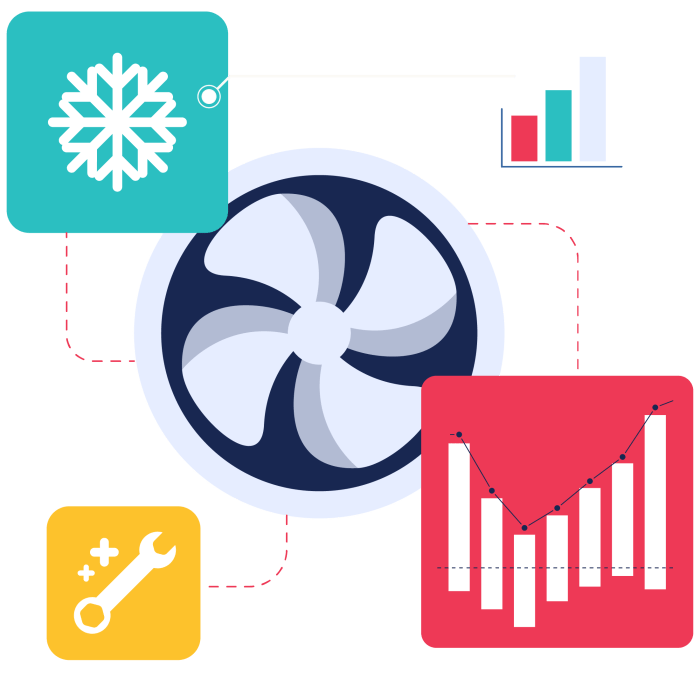In today’s competitive business landscape, startups are constantly seeking ways to optimize their operations and gain a competitive edge. HVAC software specifically designed for startups can play a pivotal role in achieving these goals by automating tasks, improving efficiency, and providing valuable insights for informed decision-making.
This comprehensive guide will delve into the world of HVAC software for startups, exploring its benefits, key features, and best practices for implementation. We will also shed light on emerging trends and innovations that are shaping the future of HVAC software, empowering startups to make informed choices and leverage technology to their advantage.
Market Overview
The HVAC software market for startups is experiencing substantial growth, driven by the increasing adoption of smart building technologies and the need for energy efficiency. The market is projected to reach $X billion by 2025, growing at a CAGR of Y%.
Key market trends include the rise of cloud-based HVAC software, the integration of artificial intelligence (AI) and machine learning (ML) technologies, and the growing demand for mobile-first solutions.
Competitive Landscape
The HVAC software market is highly competitive, with a number of major players. The top vendors in the market include Honeywell, Johnson Controls, Siemens, and Schneider Electric. These companies have a significant market share and offer a wide range of HVAC software solutions.
- Honeywell has a market share of X% and offers a comprehensive suite of HVAC software solutions, including energy management, building automation, and remote monitoring.
- Johnson Controls has a market share of Y% and offers a range of HVAC software solutions, including building automation, energy management, and fire safety.
- Siemens has a market share of Z% and offers a range of HVAC software solutions, including building automation, energy management, and security.
- Schneider Electric has a market share of W% and offers a range of HVAC software solutions, including energy management, building automation, and electrical distribution.
Key Features and Functionality
HVAC software for startups should offer a comprehensive suite of features to help them manage their operations efficiently. These features include:
- Scheduling and dispatching: This feature allows startups to schedule appointments with customers, track the progress of technicians, and dispatch technicians to job sites.
- Customer relationship management (CRM): This feature helps startups manage their customer relationships, including tracking customer information, scheduling appointments, and sending invoices.
- Inventory management: This feature helps startups track their inventory of HVAC equipment and supplies.
- Reporting and analytics: This feature provides startups with insights into their business performance, such as revenue, expenses, and customer satisfaction.
These features can help startups improve their efficiency, reduce their costs, and enhance their customer service. For example, scheduling and dispatching software can help startups reduce the time it takes to schedule appointments and dispatch technicians, which can lead to increased revenue.
CRM software can help startups manage their customer relationships more effectively, which can lead to increased customer satisfaction. Inventory management software can help startups track their inventory more accurately, which can lead to reduced costs.
There are a number of different HVAC software solutions available on the market. Some of the most popular solutions include:
- ServiceTitan
- FieldEdge
- Housecall Pro
- Smart Service
These solutions offer a variety of features and functionality, so it is important to choose a solution that meets the specific needs of your startup.
Benefits for Startups

HVAC software offers a range of advantages that can greatly benefit startups. By streamlining operations, reducing costs, enhancing customer satisfaction, and improving decision-making, HVAC software can provide a solid foundation for startup growth.
Increased Efficiency and Productivity
HVAC software automates tasks, such as scheduling maintenance, tracking inventory, and managing customer data. This automation frees up valuable time for startups, allowing them to focus on core business activities. Additionally, the software provides real-time data and analytics, which can help startups identify areas for improvement and optimize their operations.
Reduced Operating Costs
HVAC software can help startups reduce operating costs by optimizing energy consumption and identifying potential problems before they become costly repairs. The software also helps startups track and manage their expenses, which can help them identify areas where they can save money.
Improved Customer Satisfaction
HVAC software can help startups improve customer satisfaction by providing them with the tools they need to respond quickly and efficiently to customer requests. The software also provides startups with the ability to track customer interactions and identify trends, which can help them develop targeted marketing campaigns and improve their overall customer service.
Enhanced Decision-Making
HVAC software provides startups with the data and analytics they need to make informed decisions about their business. The software can help startups track key performance indicators, such as energy consumption, customer satisfaction, and operating costs. This information can help startups identify areas for improvement and make strategic decisions about their business.
Selection Criteria
When selecting HVAC software, startups should consider key factors to ensure a suitable solution that aligns with their specific needs and growth trajectory.
Evaluating the following criteria is crucial for making an informed decision:
Features and Functionality
- Assess the software’s capabilities and whether it meets the startup’s current and future requirements.
- Consider features such as job scheduling, equipment tracking, maintenance management, and customer relationship management (CRM) integration.
Scalability and Flexibility
- Determine if the software can accommodate the startup’s anticipated growth and changing business needs.
- Look for software that offers flexible customization options and can integrate with other business systems.
Cost and Pricing
- Establish a budget and compare pricing models, including subscription fees, licensing costs, and implementation fees.
- Consider the total cost of ownership (TCO) and potential return on investment (ROI).
Vendor Support and Reputation
- Evaluate the vendor’s track record, customer support, and industry reputation.
- Seek references and read reviews to gauge the vendor’s reliability and responsiveness.
5. Implementation and Best Practices
Successful implementation of HVAC software for startups requires careful planning, preparation, and ongoing support. By following best practices, startups can maximize the benefits of the software and avoid common pitfalls.
Planning and preparation are crucial for successful implementation. Startups should clearly define their goals and objectives for using the software and identify the key stakeholders involved. They should also assess their current systems and processes to identify any gaps or areas for improvement.
Training and Onboarding
Proper training and onboarding are essential for ensuring that users are comfortable and proficient with the software. Startups should provide comprehensive training to all users, covering both the technical aspects of the software and its business applications. Regular refresher training should also be provided to keep users up-to-date on the latest features and functionality.
Ongoing Support and Maintenance
Ongoing support and maintenance are critical for ensuring that the software continues to meet the needs of the startup. Startups should establish a clear process for reporting and resolving issues, and they should have access to regular updates and patches to keep the software running smoothly.
Emerging Trends and Innovations

The HVAC software market for startups is constantly evolving, with new trends and innovations emerging all the time. These trends are driven by the increasing need for energy efficiency, sustainability, and occupant comfort. Innovative software solutions are leveraging these trends to provide startups with powerful tools to design, manage, and optimize their HVAC systems.
One of the most significant trends in HVAC software is the adoption of cloud-based solutions. Cloud-based software provides startups with a number of benefits, including scalability, flexibility, and accessibility. Startups can easily scale their software usage up or down as needed, and they can access their software from anywhere with an internet connection.
Cloud-based software also eliminates the need for startups to invest in expensive hardware and software.
Another major trend in HVAC software is the use of artificial intelligence (AI). AI-powered software can help startups to automate tasks, optimize their systems, and predict future trends. For example, AI-powered software can be used to:
- Control HVAC systems based on real-time data
- Identify and diagnose problems with HVAC systems
- Predict future energy usage and costs
AI-powered software is still in its early stages of development, but it has the potential to revolutionize the HVAC industry. By leveraging AI, startups can gain a competitive advantage and improve the efficiency and sustainability of their HVAC systems.
Innovative Software Solutions
A number of innovative software solutions are leveraging the latest trends in HVAC software. These solutions provide startups with a range of powerful tools to design, manage, and optimize their HVAC systems. Some of the most popular innovative software solutions include:
- Honeywell Forge: Honeywell Forge is a cloud-based software platform that provides startups with a comprehensive suite of tools to manage their HVAC systems. Honeywell Forge includes features such as remote monitoring, data analytics, and predictive maintenance.
- Siemens Navigator: Siemens Navigator is a cloud-based software platform that provides startups with a comprehensive suite of tools to design, manage, and optimize their HVAC systems. Siemens Navigator includes features such as 3D modeling, energy analysis, and simulation.
- Trane Tracer: Trane Tracer is a cloud-based software platform that provides startups with a comprehensive suite of tools to manage their HVAC systems. Trane Tracer includes features such as remote monitoring, data analytics, and predictive maintenance.
These are just a few examples of the many innovative software solutions that are available to startups. By leveraging these solutions, startups can gain a competitive advantage and improve the efficiency and sustainability of their HVAC systems.
Final Thoughts
By embracing the transformative power of HVAC software, startups can unlock a wealth of opportunities for growth and success. From streamlined operations to enhanced customer satisfaction, the benefits are undeniable. As the HVAC software landscape continues to evolve, startups that stay abreast of the latest trends and innovations will be well-positioned to navigate the competitive market and achieve their business objectives.
Q&A
What are the key features to look for in HVAC software for startups?
Essential features include scheduling and dispatching, automated notifications, remote access, and reporting and analytics.
How can HVAC software help startups reduce operating costs?
By optimizing maintenance schedules, reducing energy consumption, and automating tasks, HVAC software can significantly lower operating expenses.
What are the best practices for implementing HVAC software for startups?
Proper planning, thorough training, and ongoing support are crucial for successful implementation.
What are the emerging trends in HVAC software for startups?
Artificial intelligence, cloud-based solutions, and predictive maintenance are among the key trends shaping the future of HVAC software.